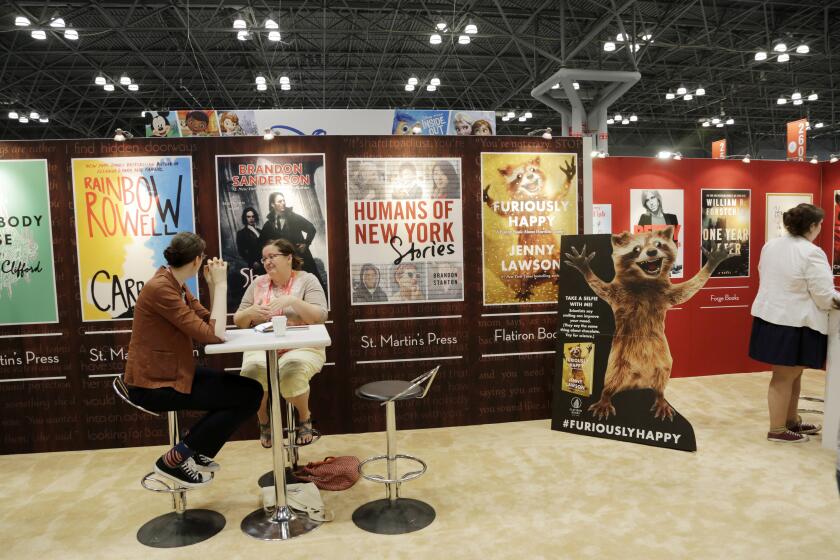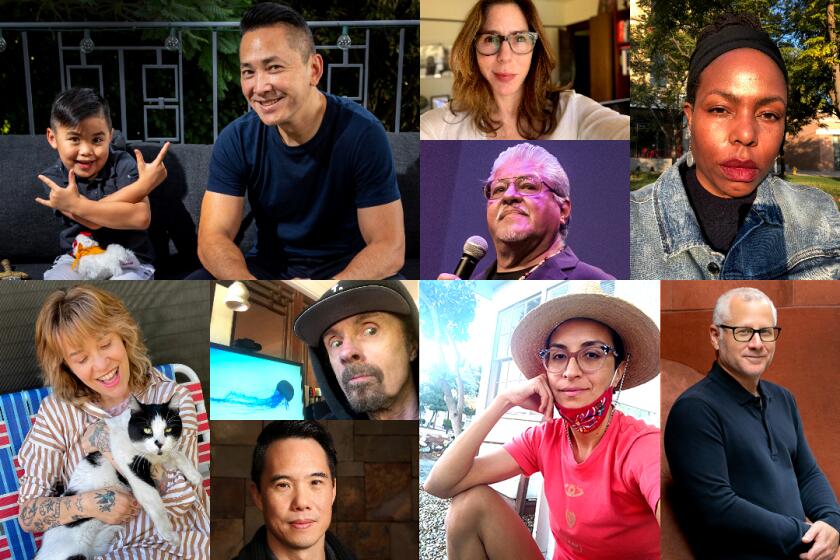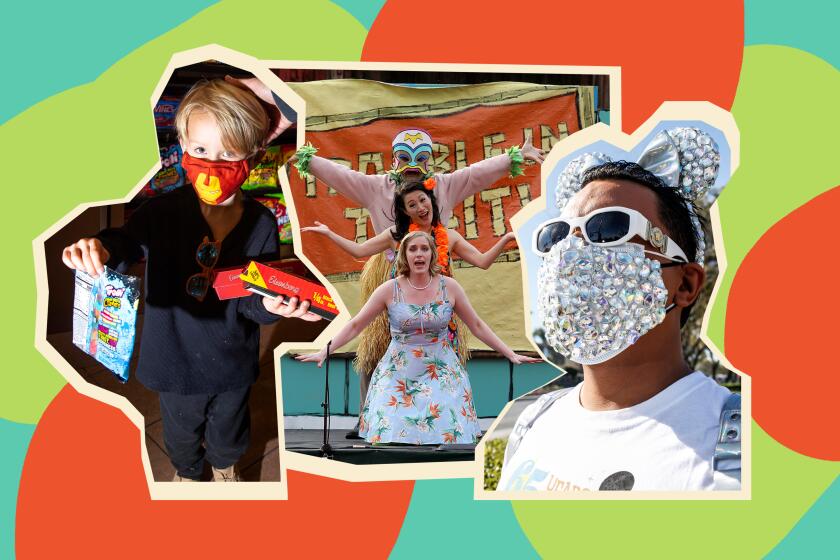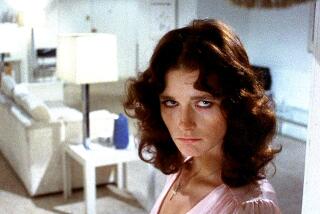The largest annual writers convention re-emerged last week. Here’s AWP by the numbers
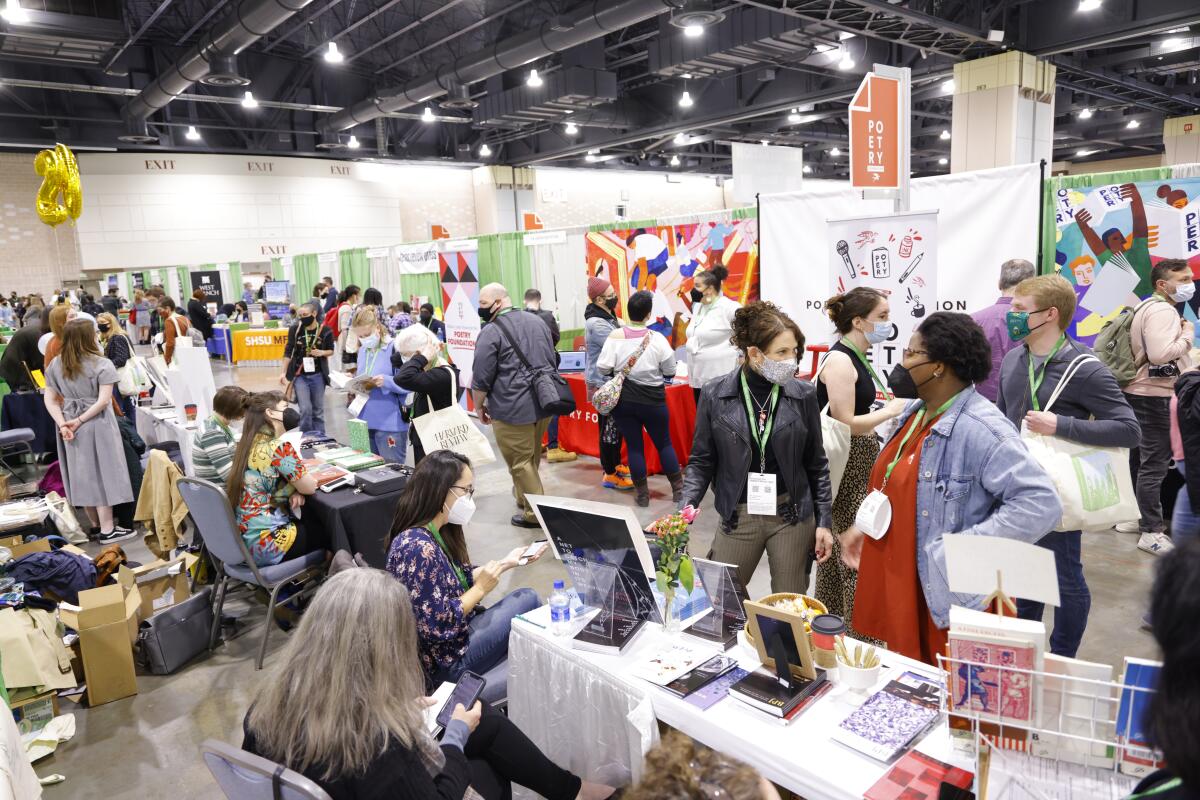
They came, they saw, they picked up 6,000 AWP tote bags.
The annual conference of the Assn. of Writers & Writing Programs took place in person in Philadelphia last week. For thousands of writers accustomed to coming together annually to talk shop and stay up late drinking, it was a long-delayed reunion.
After the demise of the long-lived BookExpo, this MFA-centric gathering represents a writer’s biggest opportunity to network, browse journals, attend panels on literary trends and assemble for bookish gossip.
The 2021 AWP conference was virtual, like so much else, because of the COVID-19 pandemic. In March 2020, bucking the trend of event and concert cancellations, AWP took place in San Antonio and was basically a ghost town. There hadn’t been a real gathering of these writers from across the country since 2019, and those who came to Philadelphia were genuinely enthusiastic to be there. The vibe was good.
For those unfamiliar with the roving literary carnival, here’s a rundown of AWP by the numbers (more or less).
Philadelphia’s 6,000 in-person attendees made up about half of the AWP conference pre-pandemic average. (An additional 800 people participated virtually.) The youngest in-person attendee was 3.5-month-old Iggy (Ignacio) Johnson-Valenzuela, there with his mother, Marissa Johnson-Valenzuela, an award-winning writer and musician who lives in Philadelphia. Iggy was remarkably chill, even at the festively loud cocktail party held by the Whiting Foundation and Bomb magazine.
BookExpo, the largest bookseller trade show in the U.S., and its consumer-facing sibling BookCon have been indefinitely canceled because of the pandemic.
Calling the convention a “book fair” is a bit of an understatement. In a large hall, 500 exhibitors set up booths for their writing programs and magazines, independent publishers and regional literary organizations. The slots numbered above 1,000, and although some exhibitors took up several adjacent booths — notably the highly regarded Iowa Writers’ Workshop, flexing — the layout was spacious. People could circulate without crowding; it took me 114 steps to get from one side of the hall to the other.
The most lively booth was about midway through, where Electric Literature had set up photo stations and had a clever suite of swag. Executive Director Halimah Marcus said she wanted it to be “interactive, playful and fun.” AWP is a chance for the editors of Electric Lit, which has 3.5 million readers a year, to meet its far-flung contributors.
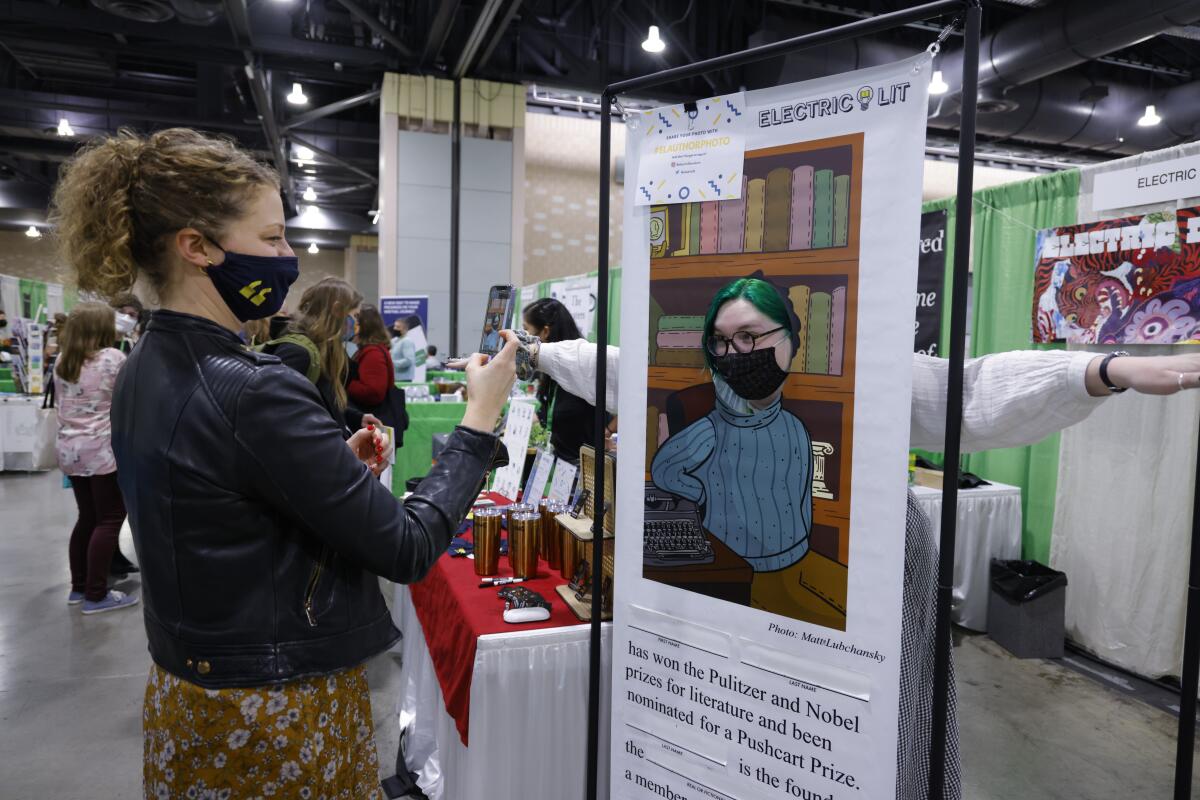
The people who’d traveled the farthest to attend were from the University of Cambridge — the one in England, 3,500 miles away — which has launched a low-residency master’s program in creative writing. Novelists Nick Bradley (“The Cat and the City”) and Joe Mungo Reed were among those at the table talking with attendees. “There’s nothing like this in the U.K.,” said Reed, whose book “Hammer” was just published in the U.S. by Simon & Schuster. “We look with jealousy on the vibrant writing scene.”
All day long in the exhibition hall, people stayed masked. Vaccinations were required and masks were mandatory at the panels. I witnessed zero anti-mask tantrums.
Like many conferences, AWP is partly for professional development, scheduled dawn to dusk with panels (about 300 of them) for a panoply of authors and interests. This year’s conference was generally low on jargon, but there were still notable moments of turbidity in the conference guide: “Considering how much the multimodal pedagogical framework lives within the realm of multicultural literacies, there is a strong case to be made that the inclusion of podcasts into the creative writing classroom could prove invaluable, especially given that many workshops fail to serve a significant portion of students who either don’t feel welcome or don’t feel capable. This panel will discuss how podcasts exist within an a priori cultural space, almost as if tailor-made to address these issues.” You don’t say.
T.C. Boyle, Viet Than Nguyen, Rachel Kushner, Carribean Fragoza, Tom Perrotta, Charles Yu, Michelle Tea, Dana Johnson, Luis J. Rodriguez on their pandemic years.
A panel poised to attract attention — “Freedom’s Just Another Word (for nothing left to lose),” about what should and shouldn’t be said in writing workshops — was attended by merely 10 people in a vast room. Far more popular was “Book Tour Revolution: Strategies for the Current World,” (head count, 100+), where YA author Chloe Gong, debut novelist Priyanka Champaneri, children’s book author Kwame Mbalia, journalist Tim Herrera and finance writer Erin Lowry tackled post-pandemic book promotion with a technology-embracing, optimistic slant. Cancel culture questions didn’t find traction with this crowd; new ways to reach readers did.
Conferences are also about socializing, of course. Afterhours, AWP is packed with parties and off-site readings and, inevitably, late-night socializing at the conference hotel bar. I met what may be the ultimate AWP couple, writers Emily Maloney and Ori Fienberg. They’d briefly dated in Iowa, but it fizzled. Living in separate cities, they made a habit of hooking up at AWP, year after year. Finally, Fienberg suggested they try dating again; they got married in 2015 and have lived happily ever after.
The first AWP conference was held in 1973 in Washington, D.C., and I wasn’t able to find anyone who’d attended that one. The most seasoned AWP veteran in attendance was writer Dinty W. Moore, a former president of the AWP board, who hasn’t missed a conference in 32 years.
Despite the precautions, the idea that AWP could happen again in March was perhaps overly optimistic. As I write this, Twitter friends are saying 5 people have reported coming down with COVID-19 since the conference. I tested negative on Saturday and, while I was writing this, tested again — still negative.
I’m not among those who want to drop masks and just pretend things are normal. Yet I find myself hoping that we can continue to safely and cautiously attend readings, share literary experiences and talk about books in person this spring. It’s been a while.
The reality of 2021 was both gentler and messier than the apocalypse fiction we consumed. But those stories taught us we can survive anything
Kellogg is a former books editor of The Times.
More to Read
Sign up for our Book Club newsletter
Get the latest news, events and more from the Los Angeles Times Book Club, and help us get L.A. reading and talking.
You may occasionally receive promotional content from the Los Angeles Times.
